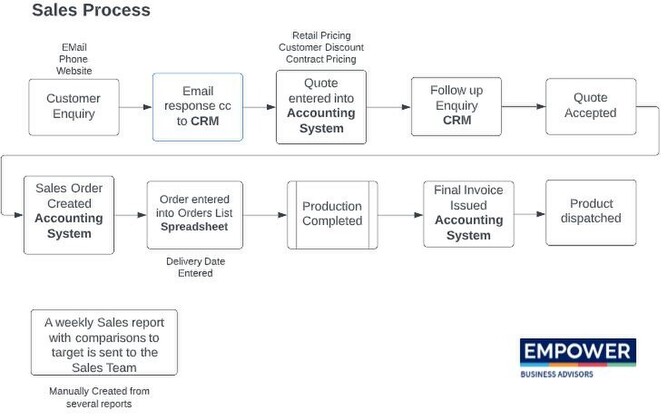Empower Business recently worked with a manufacturing company on its business systems. It’s a profitable enterprise with about 20 staff. While it had systems in place, none of them integrated with each other. This meant that each system needed updating separately, which was inefficient and a waste of time and resources.
To get an idea of the complexity, here’s an overview of the company’s sales process that Empower Business documented as part of the systems analysis:
What the diagram shows is that making a sale involves staff manually working with a number of systems:
- CRM system
- Accounting system
- Spreadsheets
- Reports.
The systems analysis completed by Empower Business revealed that none of the systems linked up to each other, so a huge amount of time was being spent on data entry. Often, the work was duplicated because several systems need to be updated to reflect one single transaction.
The company also had standalone time tracking and payroll systems.
And while the accounting software had an inventory tracking system, there was nothing in place to manage orders, purchasing, shipping, and so on. That was all done manually.
So that’s multiple standalone systems, plus spreadsheets and reports that had to be updated – for every single process in the business. That’s a lot of manual data entry!
What do you do when you have so many standalone business systems?
There are a number of options when a business has too many standalone systems:
1. Live with it
You can choose to live with your creaky business systems, but know that your business is inefficient, and that there’s a higher-than-average risk of human error. That could result in overstocks, understocks, delays, customer service issues, loss of reputation, and so much more.
Living with a bunch of out-dated systems may also prevent your business from growing. For example, you may wish to add a new division to your business – but the manual inputs and lack of flexibility may mean that this just isn’t possible.
2. Invest in an ERP (enterprise resource planning) system
ERP systems are all-singing, all-dancing systems that take care of everything: accounting, procurement, supply chain management, project management, risk management and compliance, HR, payroll, sales, CRM, production, distribution, ecommerce – and all the reporting and business intelligence (BI) that goes with it.
While ERP systems are wonderful things, they also come with a high price tag, usually starting at six figures.
The cost isn’t the only issue: installing the system correctly at the outset is a challenge, and there also has to be a significant amount of staff training and buy-in.
It’s certainly not something that should be taken lightly, and in reality it’s out of reach of most small and medium-sized businesses.
3. Invest in an ecosystem of integrated systems
Investing in an ecosystem of integrated software is the practical solution for most businesses. It’s what Empower Business has recommended to our manufacturing client.
APIs (application programming interfaces) are commonplace, and allow all types of different types of software to ‘speak’ to each other.
While this is a realistic and cost-effective solution, it is not without challenges.
What you need to know about systems integrations
Having worked with numerous clients on their systems integrations, here’s what we’ve learnt:
(a) Some systems are fine, but haven’t been set up correctly, or aren’t being used correctly
As part of our systems analysis, we might find that the software you’re using is ideal – but maybe it hasn’t been set up correctly. Or it isn’t being used correctly.
In those instances, we can help fix the systems set up – and also provide training to your staff.
(b) You need to choose the most suitable business systems (not what your mate Bob is using)
At Empower Business, we’ve often come across clients desiring a certain system, because it was recommended to them by their friend, Bob, who’s really happy with that system.
But that friend’s business is not the same as your business!
You need to undertake a systems analysis to first of all find out what you need a system to do, and put that into a systems specification. Once that’s done, you can then find software that best fits those criteria. Shoehorning your business to fit a certain system because your mate Bob recommended it is not the right approach!
Side note: If you’re not sure how to undertake a systems analysis or a systems specification, that’s something that we at Empower Business can help with. We’ll come to your business, find out how you do things, talk with your staff, document it all, and come up with customised recommendations.
(c) Choose systems that integrate – and know how this can help you
Not all integrations are created equal, so it’s important to understand just how the integration will help you.
You need to understand what happens downstream when a change is made in one of the systems.
For example, if a sales person pulls an item out of stock to send as a sample to a client, does the stock quantity on the ecommerce website also get updated? And what happens in the accounting system?
Again, that’s something that Empower Business can analyse, report on, and train your staff on.
(d) Make sure the system is set up correctly from the get-go
Existing data will need to be migrated from the old system to the new software – and done so correctly. If not, this will cause a barrage of issues further down the track.
The integrations also need to be set up and tested, so that they function exactly as planned.
As your systems integrator, Empower Business can help with your business systems set up, data migration, and testing.
(e) Staff training is crucial
Making sure your staff know how to confidently use a new system can be a headache for many business owners and managers, as they’re just getting to know the new system too.
Empower Business can train your staff to use new systems with confidence. We also recommend documenting all the new business processes: your business is at risk if business processes are only stored in your employees’ heads.
Summary
Business systems can either improve or impede your company’s efficiency, and therefore its profitability.
For most businesses it makes sense to invest in a suite of connected, integrated apps: but you need to choose the right ones, understand how they work, set them up correctly, and know how to use them.
However, this is the type of work that many business owners and managers don’t have the time or resources to undertake. But help is at hand.
Next step
Contact Empower Business for a free one-hour consultation on the effectiveness of your business systems.


